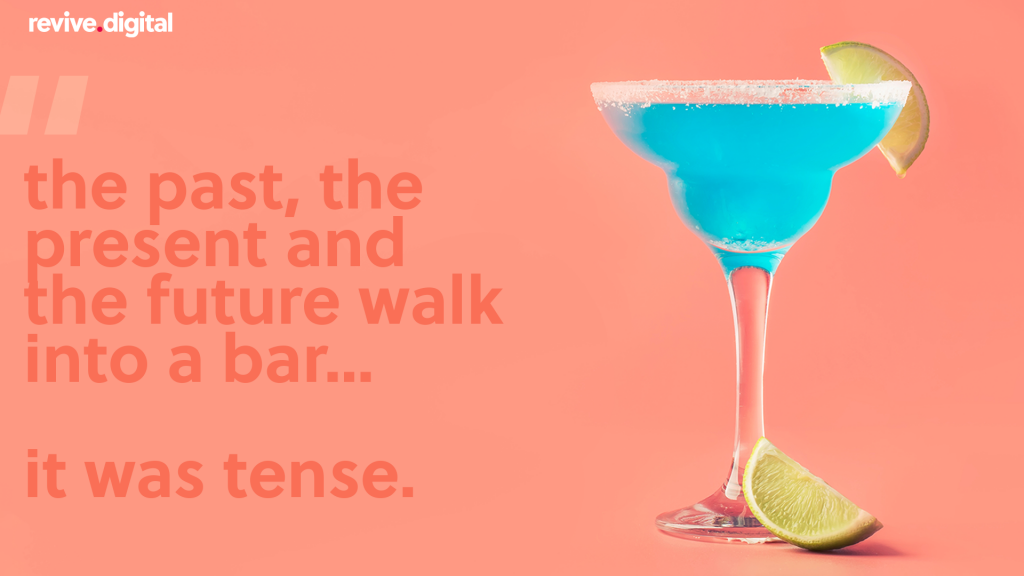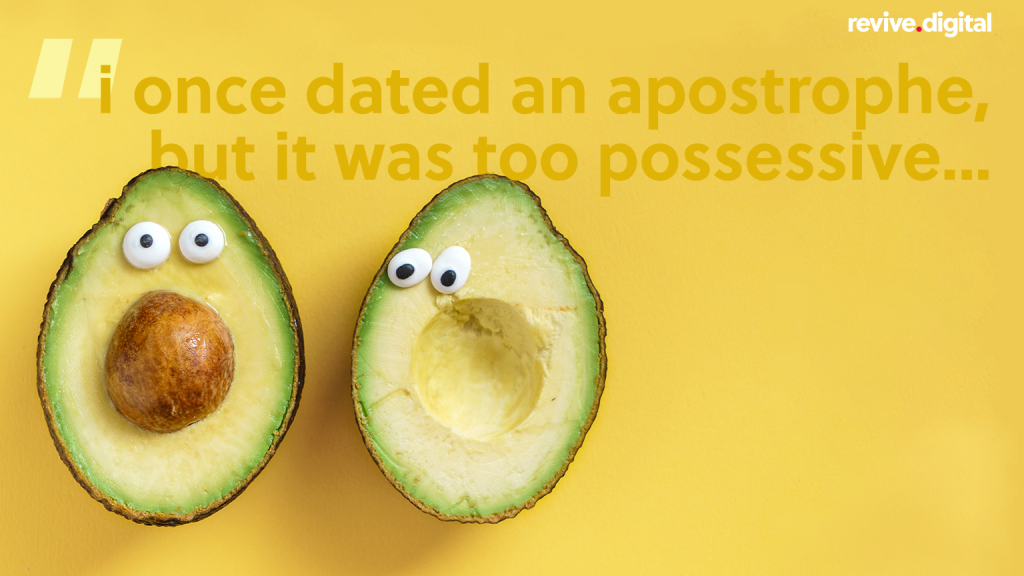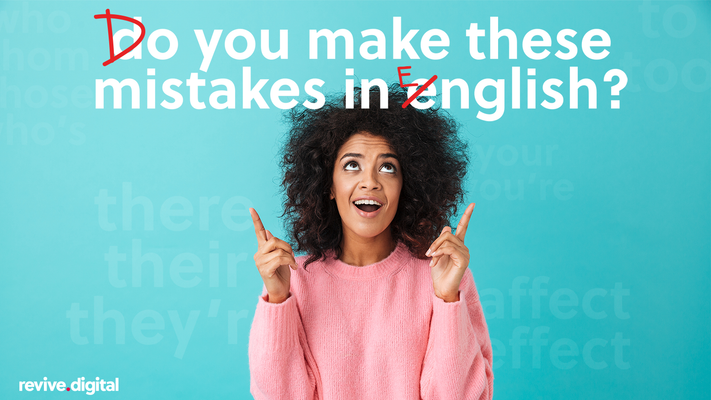Do You Make These Mistakes in English?
Do you make these mistakes in English? Yes, our headline has been shamelessly swiped… Copywriter Max Sackheim wrote the above to sell a mail order grammar course, around 1919. It became a control* for 40 years and is considered by some as the most effective headline in history. Why? For a start, it draws you in. Who wouldn’t want to know what those mistakes might be and if you’re making them? It's that effective you'll still see variations used today. And it seemed a perfect fit for this blog – on spelling and grammar in your website copy and marketing. Or more precisely… … the issue of not understanding how spelling and grammar affects your copy and marketing efforts. Or even if it does it at all? And we’re not talking about accidentally writing ‘£500 off’ instead of ‘£50 off’.  In this article:
In this article:
-
Spelling vs Marketing
-
Content in Context
-
Understanding Language
-
Some Useful Tips
-
Think in Reverse
First, though, let’s make a couple of points:
- Generally speaking, pages that rank highly in Google are well-written with proper grammar and good spelling.
- Poor grammar and spelling can reduce the trust and credibility people have in your business.
A Spelling vs Marketing Scenario
In 2011 the BBC interviewed a businessman who said that spelling mistakes were ‘costing the economy millions…’ He had identified a simple spelling mistake on one of his sites that when fixed saw his revenue for that product double. The exact details of the error were never mentioned. In digital terms 2011 was another generation. Knowledge was different. It’s not so cut and dry as a simple spelling mistake though… But it was still good PR for the business in question. If a business builds its brand affinity and is reputable, the odd typo won’t put customers off. …unless the typo drastically changes the nature of the product’s function and the prospect doesn’t understand… … but that’s about clarity. 
So, Do You Make These Mistakes in English? Content in Context
The people who weren’t buying from that business in the BBC article, probably still bought. They just bought elsewhere.
Because if you really want or really need something you will still buy it.
That’s just human nature.
There’s an argument for both sides here:
- As a business owner you don’t want people buying elsewhere.
- As a consumer if you need the product or really want it and the company is good, with all the right marketing elements in place, you’ll still buy from them even with a typo or two.
Take Amazon, one of the world’s largest companies. Sellers from all over the world have written product copy which includes poor English and bad grammar. Tech products in particular have some really questionable use of language in their descriptions. Mostly it’s stuff that’s lost in translation. This is a genuine description (typo and everything) for a speaker on sale from Amazon UK:
“Protable speakers have the long-life battery technology of the speakers provides up to 8 hours of living music, giving your office-time a more enjoyable experience.”
It’s not well-written, but you still understand what you’re getting:
- The speakers are portable
- They have a ‘long’ battery life of up to 8 hours
- They’re perfect for making a day in the office more enjoyable
Are people throwing off this product because of it’s description? As of writing this the product had nearly 10,000 reviews and was rated at 4.3 out of 5. That’s one hell of a testimonial. As an Amazon customer you know that the product will arrive, and if you don’t like it you can as easily return it. That affinity with Amazon, alongside that many positive reviews means perfect copy isn’t as important. You understand the basics of the speaker’s benefits. That, combined with the brand power of Amazon = sales. If that description were on a site that didn’t have the brand power of Amazon, it would be hard pushed to generate the trust and credibility that led to as many sales as it has achieved. And again it’s not to say that you shouldn’t care or write ‘sloppy copy’. But when your copy contains the right elements (things like brand trust, social proof, emotion as well as powerful benefits, ease and simplicity) and it’s written by someone who understands copy, the odd typo won’t matter. Lots of typos? Bad grammar? Well, that’s a different matter… 
Do You Make These Mistakes in English? Understanding Language
As a professional you need to know the rules in your field of expertise before you can stretch them. But if you find the perfect house you won’t banish Rightmove from your browsing history in disgust because the listing describes your perfect home as having a 500ft ‘graden’. Reading and writing are commonplace for most of us in the UK. But it’s mostly based on what we learned in school. Only those truly interested in language will make the effort to understand it beyond the classroom's lessons. However, school learning isn’t in line with the function of copy in a marketing context. You’re told not to start sentences with the words ‘and’ or ‘because’. This is so young children learn to construct paragraphs and don’t write: ‘I went to the park. And saw a nice dog. And I stroked the dog. Because I like dogs.’ But we do know everything about the child’s experience here. And isn’t that the point? There’s nothing wrong with starting a sentence with and or because and writing in a simple style is a skill, not a lack of. Literary genius Ernest Hemingway was famed for his simple sentences. He won the Nobel prize for literature because of them:
“He came to the river. The river was there.” Big Two-Hearted River
Always, keep in mind that famous marketing phrase: “Keep it simple, stupid!” 
Do You Make These Mistakes in English? Some Useful Tips
In his brilliant marketing blog, world-influencing entrepreneur and business guru Neil Patel featured a guest post by leading copywriter Craig Anderson. It’s titled: ‘6 Copywriting Mistakes That Shatter Conversion’ And guess what? Not a single point is about poor grammar or spellings. Here they are:
-
Not testing long form copy
‘Short and snappy’ you often hear. But beware. Long copy usually outperforms short copy, especially where there are high levels of commitment or large sums of money involved. If you were making sales in person, would you limit your word count? Or would you say as much as was needed to close the sale? You must make every word count though. Don’t go on and on just to hit a word count. People’s time is precious.
-
Using a structure that strangles your copy
Multi column pages can strangle your copy, particularly if the text is side by side. Break them up, so images and text don’t sit side by side. Or have one single idea flowing into another.
-
Believing people will understand the numbers
Is there a difference between half price and 50% off? Not mathematically but the way a prospect sees the offer changes depending on how it’s phrased. Don’t tell them what they will save. Tell them what they get extra for free.
-
Wanting landing pages like those in Twitter or Facebook
The landing pages for huge social sites like Twitter and Facebook rely on brand familiarity. It’s ok to imitate them, and it might work for your business, but you should test it because it also probably won't work.
-
Not giving a reason why
Because. It’s that easy. ‘We are doing this because…’ not just ‘We are doing this.’ Actually use the word ‘because’ in your copy.
-
Not turning positives into negatives and vice versa
This may seem odd as convention says make everything positive. But there’s validity in testing this. Will you save money? Or will you lose money if you don’t do it? One is positive, one is negative. You will only know which one people respond to better when you test it. You can read the full blog article here. Again, this isn’t a licence to produce poor quality copy because that really won’t work. But marketing copy has a different purpose to, say, writing a novel. 
Think in Reverse…
So, do you make more sales because your grammar would put Shakespeare to shame? It might be too simplistic to say that if people have time to admire your words, they aren’t being moved towards buying into your services. But it might also be true. Your reputation and the affinity people have with your brand matter more than a typo. And think in reverse. When did someone ever take a reduced service from a lesser company because a rival (but better) company had a grammatical error on their page? There’s way more to successful marketing copy than that. Language purists might argue otherwise. But there is a difference between loving a language and understanding the effectiveness of language.
Final Thoughts
Let’s clarify the point. Don’t be sloppy with your words, but typos happen – everywhere. And don’t be drawn in to battles about the odd spelling mistake costing your business. Fix them and move on. It’s the consistency that’s crucial. If your grammar and spelling are consistently poor, then it becomes a problem. If they’re consistently good people probably won’t even notice. They should be too busy being engaged and acting on what you are saying. We’re big on copy doing its job. Because we know that without understanding its effectiveness and value, copy will struggle. But not everyone in marketing understands this. And not everyone nose that skilled copywriters have been known to deliberately include typos. Why? It draws you in. It makes you engage with the article: “Dear Revive, I couldn’t help noticing that in your article ‘Do You Make These Mistakes in English’ there are a number of spelling and grammar errors...” But that’s the nature of writing copy. It’s about selling and psychology; your words should generate an action. But you gotta understand the rules, before breaking ‘em We do. If you want to no more about what we know, then give us a guaranteed typo-free call, drop us an email or say ‘high’ on social media. Weed definitely love to here from you.
Does your website copy sacrifice effectiveness and customer value for the rules of ‘perfect’ grammar? Do you worry more about being seen as credible in front of rivals than your customers?
*In marketing a control group is a section of the people you are targeting who will not receive the test marketing campaign. It means you can monitor the effectiveness of a new campaign vs the original version and see which works best.

















